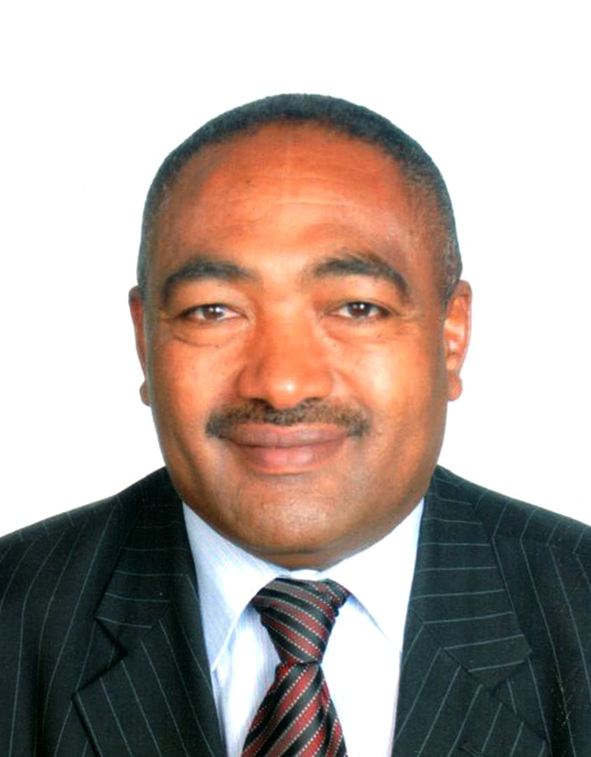Ethiopia is a country with a long history and diverse cultures. We are the oldest independent nation in the world with deep roots in our ancient civilizations. As Africa’s second-most populous country with 90 million people, Ethiopia is becoming a continental hub with capital Addis Ababa housing the African Union.
Our government is a federal republic founded in August 1995, following a transitional government that ended 17 years of Marxist dictatorship of the Derg (the Coordinating Committee of the Armed Forces, Police and Territorial Army) in 1991. Prior to the Derg regime, Ethiopia was ruled by Emperor Haile Selassie I (1892-1975).
We have a market economy that prioritizes privatizing state-owned enterprises. Our economy is largely based on agriculture, which accounts for 40 percent of the gross domestic product and 55 percent of total employment. Manufacturing and the services industry make up 14 percent and 46 percent of our GDP, respectively.
 |
| Dinberu Alemu, Charge d’Affaires of the Ethiopian Embassy. (Ethiopian embassy) |
Ethiopia has 32 universities that are constantly improving the quality and scope of their curriculums. Enrollment rate in primary school is 94 percent and 39 percent in secondary schools. Public health care has expanded coverage dramatically, administering services for millions of our citizens.
Over the last 11 years, we have managed an impressive double-digit economic growth, leading to significant reductions in poverty, registered at 22 percent last year. To continue this trend, we have embarked on mega projects in railways, infrastructure and fertilizer and sugar industries. Our ambitious Grand Ethiopian Renaissance Dam, owned and financed by our country, is currently under construction in the Benishangul-Gumuz region on the Blue Nile River.
Due to the changing climate and El Nino effect, our agriculture faced severe drought and crop failures last year, but our government managed these challenges effectively.
We aim to be a middle-income economy by 2025, and to realize our “national renaissance,” Addis Ababa has revised and implemented the five-year Growth and Transformation Plans. The second GTP is set to begin this year with an emphasis on pushing our economy from agriculture to industrial development.
Our economy has huge potentials for investment, particularly in agriculture, manufacturing, tourism, mining, hydro power and social services. Having a sizeable, young population and one of the largest markets in the continent, Ethiopia also serves as a gateway to the Common Market for Eastern and Southern Africa, a union of 19 countries with over 400 million people.
Many of Ethiopian products qualify for preferential, duty-free access to the European market under the European Union’s Everything-But-Arms initiative as well as the U.S. market under the African Growth and Opportunities Act.
Ethiopia has invited Korean companies to take advantage of its fast-growing economy, air transport networks and favorable investment climate offering a wide array of incentives. Our government has made commendable efforts in legislative and procedural reforms to attract foreign direct investment, revising our laws three times since 1992.
Ethiopia has rich tourism assets encompassing cultural, historical and archaeological heritages, including nine on the UNESCO List. We also have a great diversity of flora and fauna that comes from our sundry topography, ranging from high peaks 4,550 meters above the sea to depressions 110 meters under the sea.
Addis Ababa has initiated numerous measures to preserve and develop tourist hot spots, national parks and hotel infrastructures. As a result of these efforts, inbound tourists have surged in recent years and Ethiopia was chosen as one of the world’s best destinations last year by the European Council on Tourism and Trade.
As Africa’s largest top carrier delivering flights across the world, the Ethiopia Airlines remains a driving force behind our tourism sector. The airline provides three flights a week between Addis Ababa Bole International Airport and Incheon International Airport.
Ethiopia and Korea established diplomatic relations in 1963, when the latter opened its embassy in Addis Ababa. Ethiopia was one of the 16 United Nations countries that responded to the U.N. Security Council call to preserve peace and security of the Korean Peninsula during the Korean War (1950-1953). With our 6,030 troops, Ethiopia won all 235 battles, not losing a single soldier as a prisoner of war or missing casualty.
Having forged our relations in blood, it is high time to elevate and strengthen our partnership for the two countries’ sustainable development and prosperity.
By Dinberu Alemu, Charge d’Affaires of the Ethiopian Embassy

